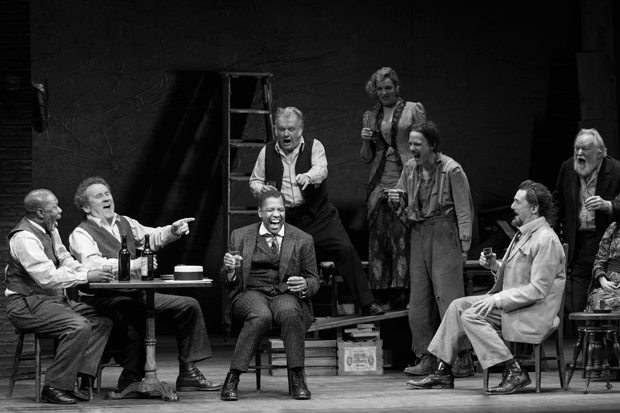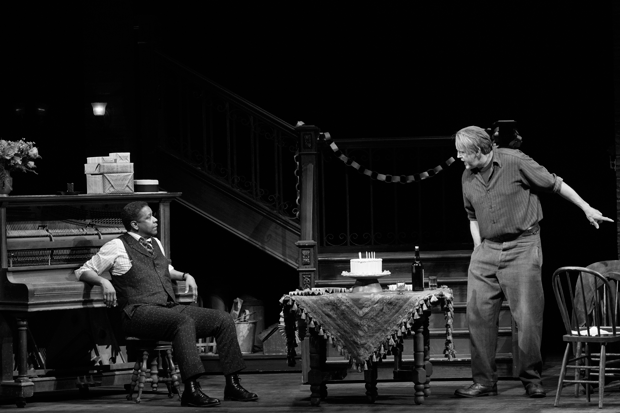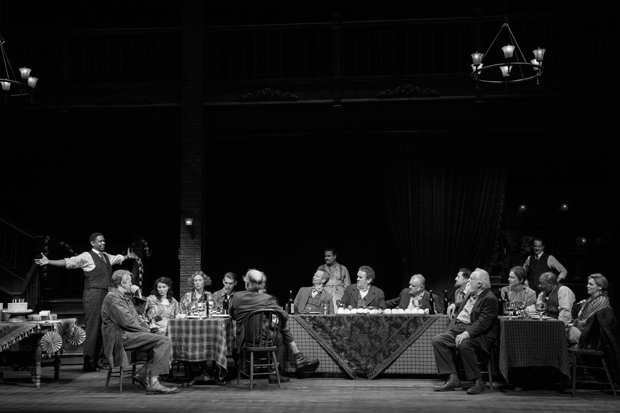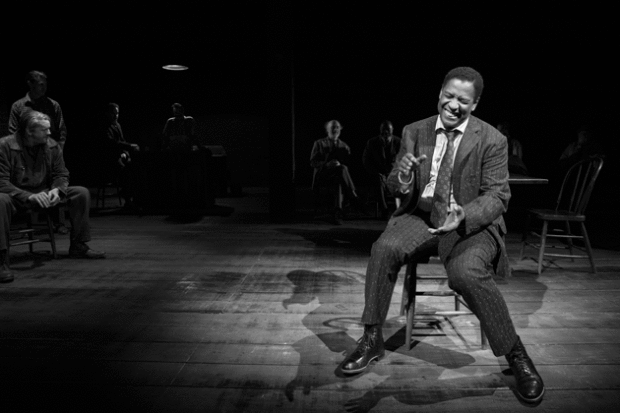Denzel Washington and an All-Star Cast Warm Up Broadway With The Iceman Cometh
Eugene O’Neill’s epic play of drunken misfits and their pipe dreams runs at the Bernard B. Jacobs Theatre.

(© Julieta Cervantes)
This Broadway season includes a few plays whose running times clock in well beyond the usual average of two hours. Angels in America runs roughly seven and a half, and the two parts of the recently opened Harry Potter and the Cursed Child total over five. By comparison, a new production of Eugene O'Neill's The Iceman Cometh, directed by George C. Wolfe, offers a somewhat abridged four-hour version of the play. While that's still long by today's standards, under Wolfe's brisk direction, the superb cast headed by Denzel Washington in the role of Hickey makes this Iceman not only engaging and fast-moving but also knee-slappingly funny.
First performed on Broadway in 1946, Iceman's length and dark, soul-crushing themes of alcoholism and shattered dreams proved a bit much for audiences. With well over a dozen roles, the play revolves less around plot than around individual characters and their chronic delusions. It takes place in Harry Hope's dreary downtown New York saloon (Santo Loquasto designed the various incarnations of the bar, with its elaborate upstairs walkway), where middle-aged men from all walks of life, as well as a couple of prostitutes, gather to nurse their pipe dreams while they ladle whiskey down their throats. Chief among them is the bar's "foolosopher" and ex-anarchist Larry Slade. He and the others are waiting for the arrival of the hardware salesman Theodore Hickman, known as Hickey, who pops in every year to treat the gang of dreamers to an all-expense-paid bender.

(© Julieta Cervantes)
One morning in 1912, just before Harry's birthday party, Hickey arrives in a dapper three-piece suit (costumes meticulously tailored to each character by Ann Roth), but he is not the man they expected. "You'll have to excuse me, boys and girls," he says, "but I'm off the stuff." The stunned crowd doesn't know what to make of the new Hickey, who makes it known that he has come to save them from their pipe dreams. Hickey doesn't mean to be a wet blanket, though, and he encourages everyone to drink up at Harry's party. He does win over some converts, who make tentative plans to lay off the sauce. He does not, however, win over the disillusioned Larry and the young Don Parritt, who turned his own anarchist mother over to the authorities. Crushed by the guilt of betrayal, Don begins to find life unbearable. So does Hickey, who has a devastating secret that threatens to undermine his message of salvation.
O'Neill spent many hours in bars like Harry Hope's listening to derelict dreamers, and some of them made it into Iceman. Fortunately, Wolfe has mined O'Neill's portrayals of them for laughs, without which Iceman can be a lethally dull and depressing affair. Washington is sure to be the main draw for many theatergoers, and he fits the bill well as the "savior" Hickey, entering with a long, smiling swagger to proclaim his gospel of redemption in Harry Hope's birthday party scene — brilliantly staged by Wolfe as a mock Last Supper. As Washington's Hickey smiles Christ-like over the proceedings, he, unlike the others, conspicuously wears a watch. We learn why when Washington sits center stage (illuminated by Jules Fisher and Peggy Eisenhauer's dramatic lighting) and delivers Hickey's final speech directly to the audience in a performance tinged with pathos and horror. False prophets fall, and this one knows he's out of time.

(© Julieta Cervantes)
Though Washington gets top billing, Wolfe has thankfully approached this play as a grand ensemble piece that offers all its actors the chance to illuminate their characters' quirky personalities and delusions. David Morse plays Larry, a man who has abandoned all hope of affecting positive change in the world, with a stolid resignation in one of the production's less engaging performances, despite his ferocious scenes with Washington and Austin Butler as the guilt-ridden Don. But Bill Irwin is a riot as Ed Mosher, a former circus man who dexterously sneaks shots of whiskey without Harry noticing, along with Frank Wood, who plays the British infantry captain Cecil Lewis with comical indignation. Colm Meaney's Harry barks and snaps like an abused animal trapped in a cage; his attempt to leave the bar, after sequestering himself there for 20 years following his wife's death, uncomfortably blends humor and pity. The same is true of Neal Huff as Harvard dropout Willie Oban, whose wild, uncombed coif (designed by Mia M. Neal) deserves an award.
Michael Potts stands out for his powerful performance as the black, erstwhile entrepreneur Joe Mott, who shouts down his white abusers — bartender and pimp Rocky Pioggi (a tough-talking Danny McCarthy) and bartender Chuck Morello (a slick, gangster-like Danny Mastrogiorgio) — with fiery invective that resonates today. Reg Rogers gives ironic urgency to Jimmy Tomorrow, the play's embodiment of perpetual procrastination, and Clark Middleton, despite an accent that renders much of his dialogue unintelligible (Dan Moses Schreier's less-than-optimal sound design doesn't help), gets consistent laughs with his portrayal of the babbling ex-anarchist Hugo Kalmar. Nina Grollman and Carolyn Braver also pepper the stage with campy flourishes as Margie and Pearl, two prostitutes who refuse to acknowledge their profession.
This ensemble brings Iceman to life in a way that illuminates the play's bleak worldview without getting bogged down by it. O'Neill may have been predisposed to focus on the tragic side of the human condition, but this production illustrates how he saw humor as a way to plow through life's myriad miseries and disappointments. "In spite of my scars, I'm tickled to death with life!" he once said. "I wouldn't 'go out' and miss the rest of the play for anything." Even at four hours, you won't want to miss this one, either.

(© Julieta Cervantes)









